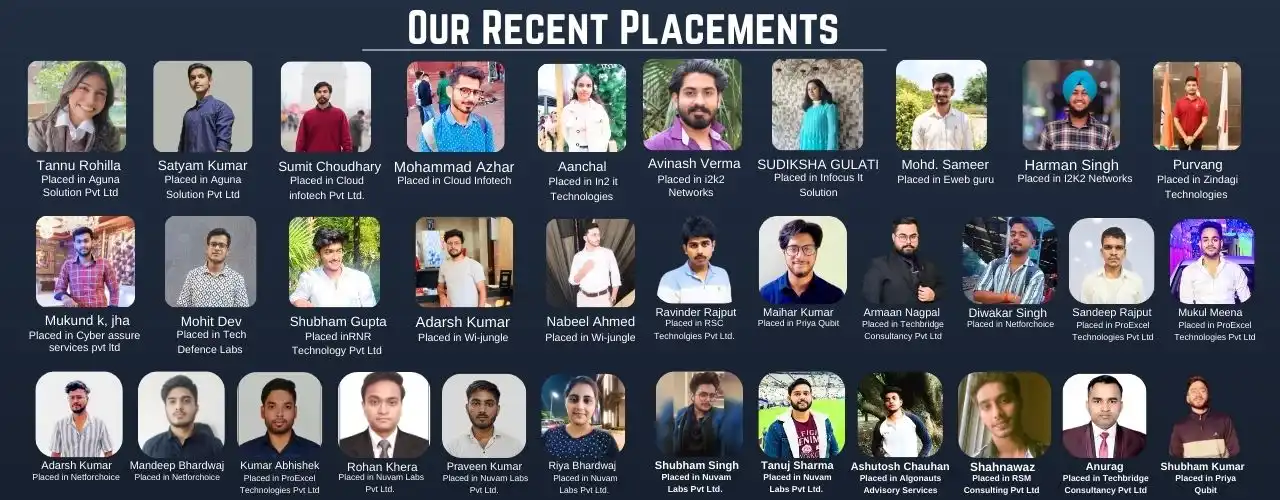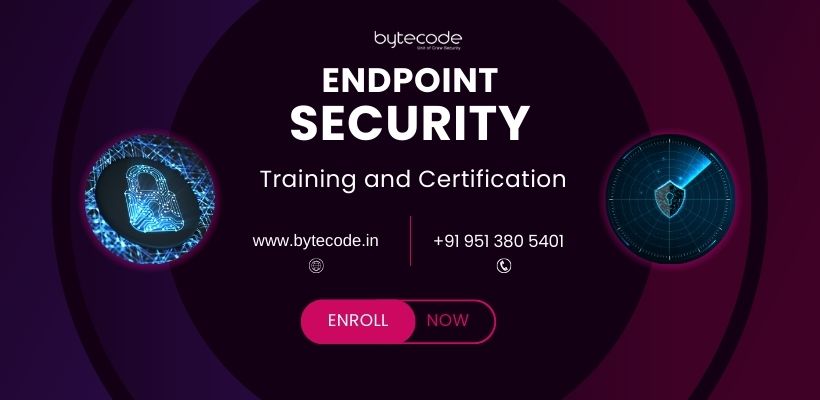Best Endpoint Security Course with AI in Delhi with Certification 2025
Anyone who is really interested in learning about the Endpoint Security Course with AI can sign up for this course and learn from an extremely skilled and informed teacher. This teacher can effectively advise and guide learners, helping them to go from being a beginner to a skilled information security professional. A thorough curriculum for the Best Endpoint Security Certification with AI basics is available from the Bytecode Cyber Security Institute.
Our cutting-edge facilities, at Bytecode Security, which is one of the leading Cybersecurity Institutions in Delhi NCR, this certification training is held with full exposure to AI fundamentals under well-crafted guidance of world-class training professionals with more than 10 years of classic work experience. Our organization has been running effectively for more than a decade.

What is Endpoint Security in Cyber Security?
Within the realm of cyber security, endpoint security refers to the protection of the different devices that are networked together, such as PCs, laptops, smartphones, and Internet of Things (IoT) devices. Moreover, because they serve as the point at which a network connection terminates, these devices are frequently referred to as “endpoints.”
Moreover, Endpoint Security includes the application of an extensive collection of hardware, software, and proven techniques to protect these devices against a range of cyber threats, such as viruses, malware, and unauthorized access attempts. The following are a few often employed endpoint security measures:
| Firewall | An inbound and outgoing network’s traffic flow is monitored and controlled by a firewall, a network security device, in compliance with pre-established security rules. |
| Antivirus Software | The purpose of antivirus software is to detect and remove malware and other types of harmful software from a computer system. |
| Endpoint Protection Software | With the purpose of providing endpoint devices with a complete security solution, endpoint protection software includes features, such as firewall capability, intrusion detection systems, intrusion prevention systems, and antivirus capabilities. |
| Patch Management | Patch management is the methodical process of identifying, assessing, and applying software updates to address vulnerabilities and reduce the possibility of potential exploits. |
| Device Controls | Device controls are put in place to restrict access to devices, applications, and network resources, ensuring that only authorized users can access them. |
| Security Awareness Training | Security awareness training is an important resource that helps end users understand possible risks and best practices for protecting their own devices. |
To put it briefly, Internet of Things (IoT) devices are often the first point of entry for cyberattacks and can also act as potential conduits for the spread of malware and other types of threats throughout a network. For these reasons, endpoint security is crucial to the field of cyber security. Putting in place a thorough endpoint security plan can help to reduce these risks and offer a defense against online threats.
Learn Endpoint Security Course in Delhi
An individual with a strong understanding and a sincere interest in the fields of ethical hacking and information security can actively pursue the opportunity to attend endpoint security training in Delhi in order to obtain a thorough understanding of the most reputable endpoint security certification in India for the year 2024. Expert and experienced mentors and trainers are leading this program. Apart from the vast experience that our training staff members have, which comes from their combined experience of more than 8 years in teaching endpoint security classes, our company has established a notable reputation for providing excellent endpoint security certifications for people with little to no prior knowledge in the New Delhi and surrounding National Capital Region (NCR).
In every Delhi NCR location, Bytecode Security offers the most thorough endpoint security training. The goal of this course is to enhance students’ knowledge and abilities so they may succeed in a cutthroat professional environment and gain jobs at prestigious IT companies.
Learn Endpoint Security Course with AI in Delhi
An individual with a strong understanding and a sincere interest in the fields of ethical hacking and information security can actively pursue the opportunity to attend world-class AI-based Endpoint Security Training in Delhi NCR in order to obtain a thorough understanding of the most reputable endpoint security AI certification in India for the year 2025. Expert and experienced mentors and trainers are leading this program. Apart from the vast experience that our training staff members have, which comes from their combined experience of more than 8 years in teaching endpoint security classes, our company has established a notable reputation for providing excellent endpoint security certifications for people with little to no prior knowledge in the New Delhi and surrounding National Capital Region (NCR).
In every Delhi NCR location, Bytecode Security offers the most thorough endpoint security AI-based training. The goal of this course is to enhance students’ knowledge and abilities so they may succeed in a cutthroat professional environment and gain jobs at prestigious IT companies.

Take Online Classes for Endpoint Security Courses with AI
Many people in society do not have enough time to attend the Endpoint Security Course with AI that is provided by a respected university located in a well-known urban area. With the goal of giving students the best certification possible in this subject, Bytecode Security has created an online Endpoint Security Course with AI that covers all of the fundamental security concepts.
We are an esteemed Delhi-based organization with a focus on endpoint security education. We cover endpoint protection training subjects and fundamental security principles in detail in our program. With the thorough endpoint security planning training provided in this course, motivated students will be able to successfully carry out a variety of professional responsibilities.
Eligibility for Endpoint Security Course with AI in Delhi
Bytecode Security is a suggested choice if you’re looking for the most reliable organization in Delhi that offers Endpoint Security Courses with AI. Bytecode Security is renowned for providing those new to the sector with AI-based endpoint security certifications of the highest caliber. The organization is home to a group of highly skilled instructors who are committed to providing top-notch teaching and have a wealth of experience. Furthermore, the Delhi National Capital Region’s Saket and Laxmi Nagar are home to Bytecode Security’s cutting-edge facilities.
In addition, in order to enroll in this Endpoint Security Course with AI in Delhi, students must submit a 12th-class passed certificate duly obtained from a recognized board.
Students can attend classes from their homes. It takes less time to attend an online class. At the same time, various groups can attend online classes with bytecode Cyber Security From home.
Best Endpoint Security Course with AI Syllabus
- Module 01: Implementing Internet Security Antivirus
- Lesson 01: Importance of Internet Security
- Lesson 02: Malware
- Lesson 03: Antivirus protection
- Lesson 04: Internet security tips to know
- Module 02: Multi-Factor Authentication
- Lesson 01: Three Main Types of MFA Authentication Methods
- Lesson 02: How Multi-Factor Authentication Works
- Lesson 03: MFA Examples
- Lesson 04: Two-Factor Authentication (2FA)
- Lesson 05: Adaptive Authentication or Risk-based Authentication
- Module 03: Mobile Device Management For Industry
- Lesson 01: What is mobile device management
- Lesson 02: How mobile device management works
- Lesson 03: Application security
- Lesson 04: Identity and access management (IAM)
- Lesson 05: Endpoint security
- Lesson 06: BYOD mobile device management
- Module 04: Data Loss Prevention (DLP)
- Lesson 01: DLP Basics
- Lesson 02: Who uses DLP
- Lesson 03: Why we need DLP
- Lesson 04: How does DLP work
- Lesson 05: DLP solutions
- Module 05: Security Information and Event Management with AI
- Introduction to AI in SIEM
- AI-Enhanced Indexing
- AI-Powered Log and Alert Analysis
- AI-Driven Dashboard Creation
- AI for Event Type Classification and Prediction
- Module 06: APT Attack
- Lesson 01: What is APT Attack
- Lesson 02: Advanced persistent threat (APT) progression
- Lesson 03: APT security measures
- Lesson 04: Application and domain whitelisting
- Lesson 05: Access control
- Module 07: Mitre Attack Framework
- Lesson 01: Introduction to Mitre
- Lesson 02: Matrix
- Lesson 03: Tactics
- Lesson 04: Techniques and Sub-Techniques
- Lesson 05: Mitigation
- Module 08: EDR and XDR with AI
- Introduction to AI in EDR/XDR
- AI-Enhanced Common EDR/XDR Products
- AI-Powered Process Termination and Threat Mitigation
- AI-Driven Endpoint Management with EDR/XDR
- Integrated Use Cases: AI in SIEM, EDR, and XDR
- Module 09: Unified Threat Management
- Lesson 01: Introduction to Unified Threat Management
- Lesson 02: Feature of UTM
- Lesson 03: Benefit of using UTM Solution
- Module 10: AI-Fortified Firewall
- Introduction of AI in Firewall
- AI-Powered Reasons behind the need for Firewalls
- AI for Modern Firewalls
- AI Reinforced Basic firewall technologies
- AI-based Next Gen Firewalls
- Module 11: AI Enhanced ISO 27001
- Overview of AI into ISO 27001
- AI Facilitated updations in ISO 27001
- AI towards Simplifying clauses of ISO 27001
- AI-powered control implementation and monitor
Endpoint Security Fundamental Course: Duration
- Course Duration: 60 Hours
- Course Level: Intermediate
- Include: Training Certificate
- Language: English, Hindi
- Course Delivery: Classroom Training
- Course pdf: Click here to Download
Key Specializations to the Endpoint Security Course with AI
- Implementing Internet Security Anti Virus.
- Mobile Device Management For Industry
- Security Information and Event Management
- Two-Factor Authentication Implementation
- Data Loss Prevention Overview & Implementation
- Unified Threat Management
- Next-Generation Firewall
- ISO 27001 Lead Auditor Guidelines
Our Students are placed in Companies




Best Endpoint Security Certification Course Reviews
Frequently Asked Questions
About Endpoint Security Training Course in Delhi
What is the minimum qualification for cyber security?
For those interested in a career in cyber security, a bachelor’s degree in computer science, information technology, information systems, or a closely related topic is usually the lowest educational requirement. In some cases, it may be considered appropriate to replace a formal degree with relevant information technology experience and accredited professional qualifications.
However, interested individuals can sign up for Bytecode Security's Endpoint Security Course with AI, where they will be able to learn from renowned professionals in an excellent mentoring program. In order to be admitted, candidates must present a legitimate transcript from any accredited school, wherever in the world they may have completed their 12th grade.
What are the different types of endpoints?
The subsequent section enumerates the many classifications of endpoints:
- Private Endpoints,
- Public Endpoints,
- Web Services Endpoints,
- Network Endpoints,
- API Endpoints,
- Storage Endpoints, etc.
What is an example of endpoint security?
An example of endpoint security would be the installation of antivirus and anti-malware software specifically designed to protect an endpoint from possible damage posed by malware, viruses, and other dangerous threats. Moreover, device control, access control, and patch management are only a few of the tactics that make up endpoint security; they all work toward ensuring the security and currency of every endpoint on a network.
What does an endpoint security engineer do?
The design, execution, and tracking of security protocols for an organization’s numerous endpoints, such as desktop and laptop computers, mobile devices, and other internet-connected devices, are among the responsibilities of an endpoint security engineer. This includes developing and putting into practice security measures including firewalls, endpoint encryption, intrusion detection/prevention systems (IDS/IPS), and antivirus software. Monitoring endpoints to spot any security threats is the responsibility of endpoint security engineers. They also have to look into security incidents and provide technical support for any security-related issues.
What are the benefits of endpoint security?
There are some notable advantages associated with endpoint security:
- Enhanced Protection,
- Improved Visibility,
- Automated Updates,
- Increased Productivity,
- Cost Savings, etc.
What is the best endpoint protection?
The best option for endpoint security depends on personal preferences, budgetary limitations, and environmental circumstances. Symantec Endpoint Protection, McAfee Endpoint Security, Trend Micro OfficeScan, Kaspersky Endpoint Security, Sophos Endpoint Protection, and CrowdStrike Falcon are a few popular options for endpoint protection in the cybersecurity space.
Installing SheildXDR, the Best XDR Solution in India, is another option. This highly reputable Craw Security product is typically extremely inexpensive, reasonably priced, and simple to use. You can reach us by phone at +91-9513805401 to schedule a demo session of ShieldXDR. Our team of highly qualified and experienced penetration testers will handle all the arrangements.
What are endpoint security tools?
Endpoint security tools are specialized solutions that successfully defend a company’s or home office’s network against a variety of security threats, including ransomware, malware, and other hostile entities that could compromise the underlying IT infrastructures.
What is the highest salary of endpoint security in India?
In India, the maximum salary for endpoint security professionals is approximately ₹12 LPA.
Is endpoint security cyber security?
Within the larger topic of cyber security, endpoint security stands out due to its particular scope and concentration. It is vital to emphasize that while endpoint security is closely related to cyber security, it should not be confounded with the overall idea. Protecting the numerous endpoints within a computing network — such as PCs, mobile phones, and other internet-connected devices — against potential cyberattacks requires endpoint security. On the other hand, networks, systems, and data are protected from cyberattacks by a broad range of technologies, procedures, and practices that make up cyber security.
Now, if you've grown interested in learning about endpoint security in Delhi NCR, you can enroll in Bytecode Security's top-notch Endpoint Security Course with AI. It is taught by highly qualified instructors with over 8 years of excellent experience in the fields they specialize in.
Why endpoints are used?
Endpoints give users a way to access resources on a network. Communication entrance and exit points are typically connected to a fixed IP address. Endpoints are employed in order to send and receive data, control equipment, or have access to applications. Furthermore, these systems are used to guarantee security, authenticate, and grant permission.




























